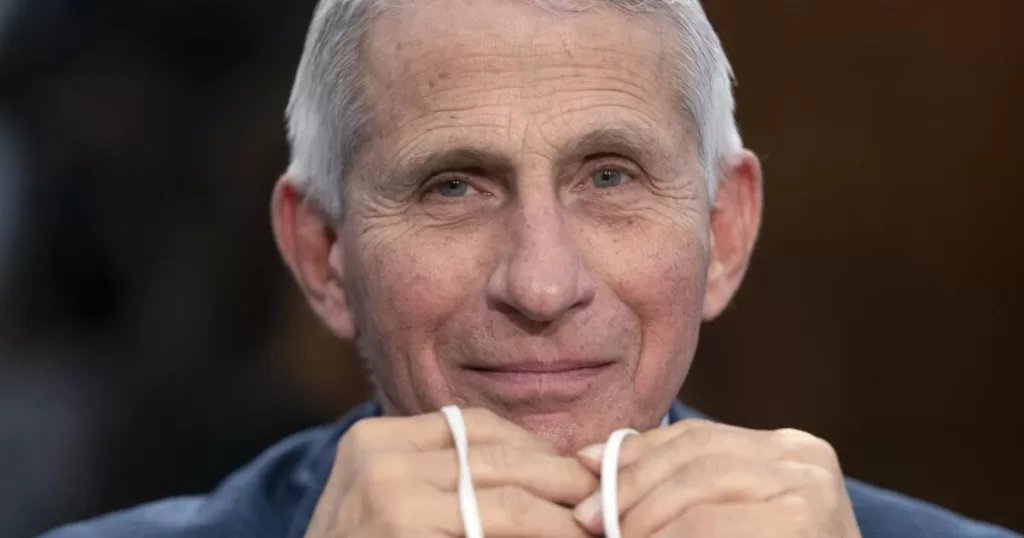As director of the National Institute of Allergy and Infectious Diseases, he was at the red hot center of the HIV/AIDS crisis, working exhaustively first to identify the agent that was killing so many young gay men and then to develop treatments to keep them alive.
As the public face of the government’s response, he was vilified by activists such as the playwright Larry Kramer, the founder of the radical group ACT UP, and accused of having blood on his hands. They wanted him to allow people dying of AIDS to be treated with promising but still experimental drugs.
Finally, and without warning other officials, Fauci publicly called for a change in policy to provide access to drugs while they were in trials. Then-President George H.W. Bush’s chief of staff, John Sununu, called Fauci to find out “what the hell is going on,” the 83-year-old physician recounts in his new memoir, “On Call.”
Later, at a government hearing on the new policy, Kramer, who was famous for his outbursts, yelled from the back of the room, “Tony, I have called you a murderer in the past, but you are now my hero.”
“Go figure,” Fauci writes.
That muted reaction is vintage Fauci.
As a middle-class Italian American kid growing up in New York City, Fauci was schooled by Jesuits and excelled at basketball. He sailed through college and medical school at the top of his class and loved every moment. He opted for a career at the highest levels of public health, where he could cure diseases and treat patients too.
Fauci’s prose is less poetic and more Joe Friday, but his humanity shines through on every page.
In 2014, for example, Fauci insisted on being photographed hugging Nina Pham, a Texas nurse he had treated for Ebola, to ease her fears about the stigma of the disease.
In 2021, he knocked on doors in Washington’s Ward 8, a primarily Black neighborhood, with Mayor Muriel Bowser, encouraging people with deep mistrust of authorities to get vaccinated. “I am very well aware that historically the medical community has not treated you well, and we should be ashamed,” he said at Harlem’s Abyssinian Baptist Church. “But that is history. These vaccines are designed to save everybody — you and me.”
Over the administrations of seven American presidents, Fauci helped steer the nation through HIV/AIDS, the post-9/11 anthrax panic, influenza pandemics, Ebola, Zika and SARS. By the time COVID-19 emerged as a once-in-a-lifetime public health threat, Fauci was as seasoned a political player as he was a scientist.
And yet nothing, really, could have prepared him for the bizarre challenges of the Trump era.
Unraveling the mysteries of the constantly mutating novel coronavirus was difficult enough. Doing so alongside the partisan clowns of the Trump administration, including the president himself, was almost farcical at times. But, Fauci writes, “I had to tell the truth to the American people.”
He writes that it was painful to publicly contradict the president, who — thanks to prodding from the likes of Fox News’ Laura Ingraham and White House official Peter Navarro (neither of whom had any medical expertise) — embraced the antimalarial drug hydroxychloroquine as a treatment for COVID. Early in the pandemic, the Food and Drug Administration gave the drug emergency approval to treat the disease, only to revoke it when it proved ineffective and was found to cause heart problems and even death.
Although Fauci recounts many insulting and profanity-laced conversations with Trump, he is so measured and respectful in his assessment of the former president that it’s almost comical.
“President Trump’s tendency to announce that he loved me and then scream at me on the phone,” he writes, “well, let’s just say I found this to be out of the ordinary.”
He could have unleashed well-deserved fury on the former president and his lackluster response to a disease that ended up killing more than a million Americans. Instead, he writes, so many deaths “should never have happened and likely would not have happened had the right tone been set by the highest levels of government for the promotion of proper public health principles and practices right from the start of the outbreak.”
In contrast, Trump’s vilification of Fauci has made him a predictable target of vitriol and worse. He recounts the vicious conspiracy theories that led to violent threats against him and necessitated round-the-clock security: He was a Hillary Clinton mole planted in the White House to destroy Trump. He was out to abolish the 2nd Amendment. His wife is the sister of Jeffrey Epstein’s girlfriend Ghislaine Maxwell. He tortured puppies for science. He was responsible for the very creation of SARS-CoV-2.
He was also baselessly accused of “crimes against humanity” and sexual assault. Republican congressional candidates vowed to put him in prison. Pro-Russia conspiracy peddlers said Moscow’s airstrikes in Ukraine were aimed at bioweapons labs where Fauci was developing a COVID-19 sequel.
“Welcome to my dystopian nightmare,” he writes.
The absurdity continues to this day, of course. This month, Fauci testified before the House Select Subcommittee on the Coronavirus Pandemic, whose MAGA Republican representatives seized the opportunity to beclown themselves as usual.
“You’re not a doctor,” spat Georgia Rep. Marjorie Taylor Greene.
Fauci — who has received the Presidential Medal of Freedom, the National Medal of Science and 62 honorary doctorates and has written, cowritten or edited more than 1,400 scientific publications — didn’t respond.
He didn’t have to. He’s been saving lives longer than she’s been alive.
